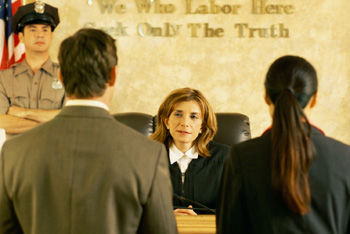 May 13, 2013 – Nely Robles was charged in Fond du Lac County Circuit Court with a misdemeanor and a felony. Under a plea agreement, Robles pleaded no contest to identity theft – a felony – and the prosecutor agreed to dismiss a misdemeanor count. Judge Peter Grimm withheld sentencing, and placed Robles on probation for two years. Robles filed a postconviction motion asking to withdraw her plea on the grounds that she did not know that she had pleaded guilty to a felony.
May 13, 2013 – Nely Robles was charged in Fond du Lac County Circuit Court with a misdemeanor and a felony. Under a plea agreement, Robles pleaded no contest to identity theft – a felony – and the prosecutor agreed to dismiss a misdemeanor count. Judge Peter Grimm withheld sentencing, and placed Robles on probation for two years. Robles filed a postconviction motion asking to withdraw her plea on the grounds that she did not know that she had pleaded guilty to a felony.
Writing for a unanimous court of appeals panel, Judge Mark Gundrum’s opinion in State v. Nely B. Robles, 2012AP307 (May 1, 2013), focused on the statutory requirements for plea colloquy set forth in Wis. Stat. section 971.08. Under that section, the circuit court is required to personally determine that the defendant is entering his or her plea voluntarily and with an “understanding of the nature of the charge.”
Appeals Court Relies on Bangert’s Definition of ‘Nature of the Charge’
Robles argued that several Wisconsin cases include language that implies the distinction between a misdemeanor and a felony is part of the definition of “nature of the charge.” The court of appeals, however, disagreed with Robles’ interpretation of the case law, and relied on the leading case on plea withdrawal, State v. Bangert, 131 Wis. 2d 246 (1986), and its direct progeny, which define “nature of the charge” as “referring to the elements of the charged offense or, more precisely, the elements of the offense in relation to the facts associated with that charge.” On the basis of this reading, the panel concluded that the elements and the facts are not related to the status of the charge as a misdemeanor or felony.
Attorney Brian Kinstler is filling in for Legal Writer Joe Forward during his leave. Brian practices state and federal criminal defense in Milwaukee, and blogs on criminal law issues at www.kinstlerlaw.com/blog.
The court of appeals also found it persuasive that reading from the appropriate jury instructions has been long held to be a sufficient means of informing the defendant of the nature of the charge, even though jury instructions rarely mention the word felony or misdemeanor. The court also noted that several Wisconsin Supreme Court cases involve plea colloquies in which the words felony and misdemeanor were not used, but where the supreme court never discussed this as a deficiency.
Attorney Brian Dimmer, appellate counsel for Robles, said Robles intends to petition for review, because “the Wisconsin Supreme Court has the ability to address Robles’ claim through a broader constitutional lens.”
